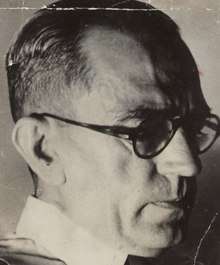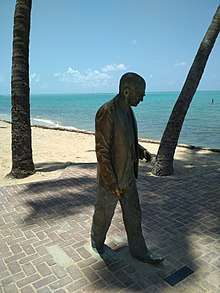Graciliano Ramos
Graciliano Ramos de Oliveira (Portuguese pronunciation: [gɾasili'ɐ̃nu 'ʁɐ̃mus dʒi oli'vejɾa]) (October 27, 1892 – March 20, 1953) was a Brazilian modernist writer, politician and journalist. In most of his novels (more prominently in Vidas secas) he depicts the precarious situation of the poor inhabitants of the Brazilian sertão.
Graciliano Ramos | |
|---|---|
 Ramos in 1940 | |
| Born | Graciliano Ramos de Oliveira October 27, 1892 |
| Died | March 20, 1953 (aged 60) Rio de Janeiro, Brazil |
| Nationality | Brazilian |
| Other names | Feliciano de Olivença Almeida Cunha |
| Occupation | Novelist, politician, journalist |
Notable work | Vidas Secas, Angústia, São Bernardo, A Terra dos Meninos Pelados |
| Height | 1.75 m (5 ft 9 in)[1] |
| Title | Mayor of Palmeira dos Índios |
| Term | 1928–1930 |
| Political party | Brazilian Communist Party |
| Spouse(s) | Maria Augusta de Barros (1915–1920) (her death) Heloísa Leite de Medeiros (1928–1953) (his death) |
| Children | Márcio Ramos (1916–1950) Júnio Ramos (1917–1975) Múcio Ramos (1919–1994) Maria Ramos (1920–1980) Ricardo Ramos (1929–1992) Roberto Ramos (1930)[2] Luísa Ramos (1931–) Clara Ramos (1932–1993) |
| Parent(s) | Sebastião Ramos de Oliveira (died 1934) Maria Amélia Ramos (died 1943) |
Life
Graciliano Ramos de Oliveira was born in the city of Quebrangulo, in the Brazilian state of Alagoas, on October 27, 1892, to Sebastião Ramos de Oliveira and Maria Amélia Ramos. Graciliano was the oldest of the couple's 16 children.[3]
He would spend most part of his childhood travelling through different cities of Northeast Brazil. After finishing high school in Maceió, he became a collaborator of the newspaper Jornal de Alagoas in 1909, where he published a sonnet called "Céptico" under the pen name Almeida Cunha, and some other texts under many different pseudonyms. He also published texts in the magazine O Malho, under the pen name Feliciano de Olivença, and founded a short-lived periodical named Echo Viçosense in 1906.
In 1914 he moved to Rio de Janeiro, but had to return to Alagoas in September 1915, in order to live with his father, who became a salesman in the city of Palmeira dos Índios. Also in 1915, he married his first wife, Maria Augusta de Barros, having with her four children. Maria Augusta died in 1920, due to troubles during childbirth.
In 1927, Ramos was elected mayor of Palmeira dos Índios: he took office in 1928 and would abdicate his post in 1930. Mesmerized by the high literary quality of his prefecture reports, Augusto Frederico Schmidt would approach Ramos into publishing his first novel, Caetés, that Ramos started to write circa 1925. He would finish Caetés in 1930, but did not publish it until 1933. In 1928, he married his second wife, Heloísa Leite de Medeiros, having with her four more children.
From 1930 to 1936 he lived once again in Maceió. In 1934 he published the novel São Bernardo, and in the following year, he was arrested due to alleged (but never confirmed) participation in the Communist uprising of 1935. (Graciliano wrote an account of his time in prison named Memórias do Cárcere, published a few months after his death in 1953.) After being freed from prison, he publishes with the help of associates such as José Lins do Rego his most famous novel, Angústia.
In 1938 he publishes Vidas Secas and moves definitely to Rio de Janeiro, where he became in 1945 a member of the Communist Party of Brazil. In the subsequent years, he travelled alongside his wife to countries such as France, Portugal, the Soviet Union and Czechoslovakia. Also in 1945 he published an account of his childhood years, named Infância. Beginning in 1952, Graciliano's health gradually began to decline. He was diagnosed with lung cancer and, after an unsuccessful surgery, died on March 20, 1953. His wife Heloísa would die 46 years later, in Salvador, Bahia.
Graciliano is survived by one daughter and many grandchildren and great-grandchildren.
Works

Novels
- Caetés (1933)
- São Bernardo (1934)
- Angústia (Anguish) (1936)
- Vidas Secas (Barren Lives) (1938)
- Brandão Entre o Mar e o Amor (Brandão Between the Sea and Love) (1942 — written in partnership with Jorge Amado, José Lins do Rego, Aníbal Machado and Rachel de Queiroz)
Children's literature
Memoirs
Chronicles
- Linhas Tortas (Squiggly Lines) (posthumous — 1962)
Translations
Miscellaneous
- Garranchos (Scribbles) (posthumous — 2012; collection of previously unpublished texts of different genres by Ramos, compiled by Thiago Mio Salla)
Film adaptations
Ramos had three of his works adapted to cinema:
- Vidas Secas, a 1963 film by Nelson Pereira dos Santos.
- S. Bernardo, a 1971 film by Leon Hirszman.
- Memórias do Cárcere, a 1984 film also by Nelson Pereira dos Santos. Carlos Vereza portrayed Ramos in this film.
References
- Graciliano Ramos por ele mesmo Archived 2011-07-26 at the Wayback Machine (in Portuguese)
- Roberto died six months after his birth.
- Árvore genealógica de Graciliano Ramos Archived 2014-03-28 at the Wayback Machine (in Portuguese)